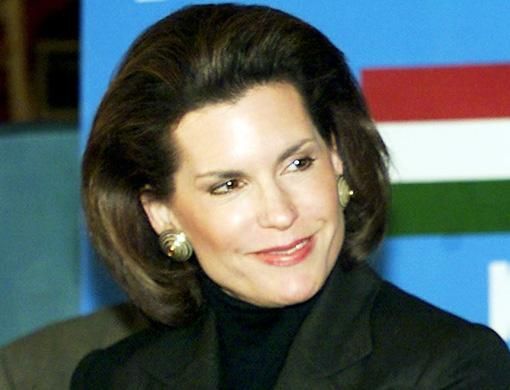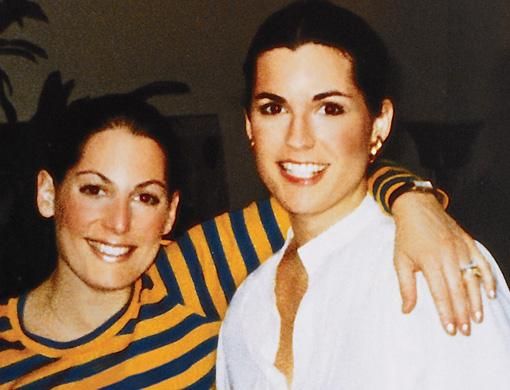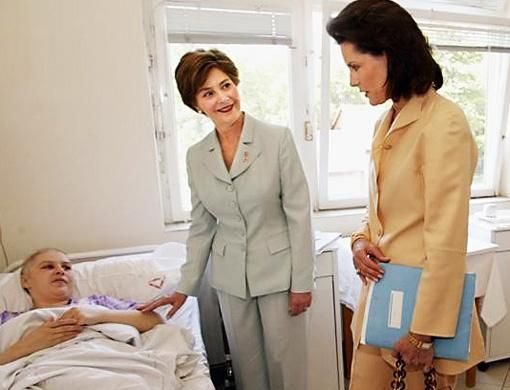When it comes to fighting a scourge like breast cancer even one person can make a difference. Nancy Brinker, who founded the Susan G. Komen Breast Cancer Foundation, is proof of this, says Shalaka Paradkar
It was a phone call that changed her life forever. Though it happened in 1978, Nancy Brinker still remembers it like yesterday. "It was a Tuesday afternoon when my sister Susan called. Her doctor had found a lump in her breast that was not a cyst and he had recommended a biopsy," Nancy recalls.
As children, the two sisters could not have been more different: Nancy was a tomboy and a mischief-maker who loved spending hours riding horses. Susan was her beautiful older sister who tried, unsuccessfully, to teach her younger sibling the finer aspects of hair, make-up and clothes.
Susan became a fashion model, married her college sweetheart, Stan Komen, and settled in their hometown of Peoria, Illinois. Nancy moved to Dallas, Texas, after her graduation. Though separated by distance, the two sisters spoke every afternoon.
After that fateful phone call in 1978, Nancy immediately flew home to Peoria to be with her sister.
Susan Komen was 33 when she was diagnosed with breast cancer. Her surgeon recommended a subcutaneous mastectomy -a procedure in which the outside of the breast is left intact, but an incision is made and the breast tissue is removed.
He would do an implant ten days later, he said. She would be left with a small scar but no more cancer. Susan felt it was her best option.
Nancy believes that the family and friends of cancer patients can learn a lot from her own family's travails after that initial diagnosis.
"According to Suzy, the surgeon told her she could be cured. But even the most respected cancer experts (which he certainly was not) do not talk about recovery in terms of surviving cancer or remission. They refrain from using the word 'cure' because cancer can recur.
"After Suzy's surgery, my parents, and I were all at the hospital anxiously awaiting the results. The surgeon walked confidently into the room and said, 'You can relax, we got it all. I believe she's cured'.
"My heart sank because I knew enough to know that cure is a very difficult word to use in reference to cancer. If it is used at all, it is more likely to be spoken after a five-year period has passed without a recurrence."
Brinker's instinct was right: six months after the surgery, her sister's cancer had metastasised (spread) to her lung and under her arm.
It was Susan's grace and humour that kept her family going through the long treatment period. "The one thing Suzy never found humour in, however, was the aesthetic conditions of the waiting rooms," recalls Brinker.
"The empty walls and uncomfortable chairs, and the long waits the patients endured, waiting six or more hours for a scheduled appointment ... Suzy was horrified and so was I.
"She was more concerned with the treatment of the patients while my concern was the treatment of her disease. I was outraged that more hadn't been learned to help my sister."
Brinker's family knew that Susan was now fighting for her life. On her part, Susan tried to reassure them by making plans for the future. One of the things she wanted to do, along with her sister, was to find a way to speed up the research.
She wanted to liven up the cheerless hospital waiting rooms and "make it pretty for the women who have to be here". Sadly, Susan didn't live long enough to set those things right.
After nine operations, and three intensive courses of radiation and chemotherapy, she lost the fight to cancer. Susan Komen was 36 when she died in 1980.
After her death, Brinker vowed to find a cure for the breast cancer that has killed her beloved sister. In 1982, she founded the Susan G. Komen Breast Cancer Foundation in her living room with a few friends, $200 that she had saved from grocery money, a broken typewriter and a list of names.
Two years later, the first Race for the Cure was held in Dallas with 800 participants. By the end of that year, the initial $200 had grown to $150,000.
Today, the Komen Foundation with its affiliates, corporate partners and donors, has invested $630 million in breast cancer research, education, screening and treatment programmes.
The Race for the Cure, the largest series of 5K run/fitness walks in the world is the foundation's signature fundraising and education event, will have more than 1 million people expected participants this year in 100 races in the USA and elsewhere.
It is one of the biggest grassroots organisations in breast cancer.
In keeping with the promise she made to Susan, patient care is high on the agenda.
"Advocacy groups, like ours, are increasingly powerful players in efforts not just to cure disease but also to define quality care.
"And like the people they represent, they offer the medical community significant support as partners in the effort to define and provide that level of care and to insist that it be the standard for third-party coverage. I consider that non-negotiable," says Nancy.
"When Susan was diagnosed in 1980, people didn't even say the words "breast cancer". That outdated attitude kept women in the dark. Today, we have a large and growing number of advocacy and support groups not just for breast cancer, but for all kinds of illnesses."
However, in many ways, Brinker believes the big challenge ever since she started the foundation has been getting breast cancer out of the shadows and into public awareness.
"From the beginning, the Komen Foundation faced daunting hurdles, primarily a lack of education and the fact that breast cancer was a taboo subject.
"My goal was, and continues to be, helping people realise that breast cancer is unpredictable with no boundaries; that breast cancer is the leading cause of death among women ages 40 to 59; that it is a family disease; that we do not know the causes, nor do we have a cure," she says.
From Susan's experience, Nancy believes a strong support network of family and friends is invaluable for the recovery process.
"A diagnosis of breast cancer can evoke a wide range of emotions, from denial to guilt, helplessness, anxiety and fear. It is a stressful time for many women and their families. That is why it is helpful to build a network and to make time to share your feelings with others."
One of the big inspirations for Susan Komen was the then-First Lady, Mrs. Betty Ford who was diagnosed with breast cancer and underwent a mastectomy in 1978.
Betty Ford's story touched Susan deeply. In her, Susan saw a woman who was brave enough to admit she had breast cancer and tell the whole world she intended to fight it. If the First Lady could do it, Susan Komen believed she could do it as well.
"Many other families won't have to go through what my family endured when we lost Susan," she says.
"The cumulative knowledge, awareness and progress in breast cancer since the past 25 years amazes me. Women used to suffer alone, but now doors have been opened so that those who face a breast cancer diagnosis have better screening and treatment options and a better quality of life.
"They also have a vast and growing support network. I just want them to know they are not alone in this battle."
In 2001, President Bush appointed Nancy Brinker to serve as US Ambassador to the Republic of Hungary. Nancy says it has been one of the most fulfilling honours of her life.
"I had the privilege of meeting women and men around the globe who are responding to the life-saving message of early detection and are fighting in the trenches everyday to bring breast health awareness to their communities."
Of all the numerous awards gracing her mantle, perhaps the most special has been the 2005 Mary Woodard Lasker Award for Public Service presented by the Albert and Mary Lasker Foundation.
"The award said I "created one of the world's great foundations devoted to fighting breast cancer and dramatically increased public awareness about this devastating disease." It was truly amazing what everyone involved in the Komen Foundation has built together."
Nancy has served on the national advisory boards of the Harvard Center for Cancer Prevention, Women's Health Resource Center, Women's Health Initiative, the National Coalition of Cancer Survivorship and the National Cancer Institute.
A few months ago, the US State Department invited the Komen Foundation to be part of the Middle East partnership for Breast Cancer Awareness and Research -the only breast cancer organisation invited.
The partnership was launched at the Komen Foundation's Mission Conference last June. For Nancy, it was especially poignant to have Linda Washkuhn, her sister's best friend and a long-time Komen volunteer in Peoria, with her during this journey.
Of her efforts in fighting breast cancer in this region, Nancy says, "The Komen Foundation hopes to help women in the UAE build the knowledge, tools and resources needed to lead the fight against breast cancer in their own communities while applying the lessons that we have learned through our work in the United States and around the world."
The fight against breast cancer is far from finished. "Our continuing challenge is that there are women everywhere who do not understand the importance of early detection and do not have access to annual screening mammography," says Nancy.
"We must remain committed to ensuring that every woman follows a positive breast health regimen by receiving regular mammography screening and clinical breast examinations and performing monthly breast self-examinations,"
But can breast cancer be prevented?
Brinker says there has been great progress over the last 30 years in identifying risk factors for breast cancer. "So far, researchers know of more than 20 factors that increase the risk of the disease. Some of these risk factors increase risk a great deal. Others increase risk by only a small amount," she informs.
And though there are steps nearly all women can take to lower their risk of getting breast cancer, sadly women still do not have full control over whether they get the disease or not. Many risk factors are still unknown or are simply out of a woman's control -such as getting older or having a family history of the disease.
There are a number of environmental factors also being actively studied in relation to breast cancer, such as whether organic food can help reduce the risk of getting cancer.
The Komen Foundation has also been supporting environmental research conducted by the National Cancer Institute (NCI), the Centers for Disease Control (CDC) & the National Institute of Environmental Health Sciences (NIEHS).
Brinker advises women not to feel helpless at the prospect of breast cancer -there is a lot they can do to protect themselves from the disease.
An optimal breast health plan would include a healthy lifestyle, regular screening and understanding what factors may be increasing her risk. Armed with this awareness, a woman can work with her health care provider to address her concerns.
"We firmly believe that an individual is her own best health care advocate, and recommend that women become familiar with their own bodies by conducting the 3-step approach to breast health: annual screening mammography for women at age 40, clinical breast examination by a medical professional at least every 3 years beginning at age 20 and annually after 40, and monthly breast self-examination beginning by age 20."
The Komen Foundation began with the question: can one person really make a difference? Today, the resounding answer is yes.
Nancy Brinker attributes some of its success to her entrepreneurial and marketing skills, and most importantly, her deep-rooted commitment to the promise she made to her sister.














